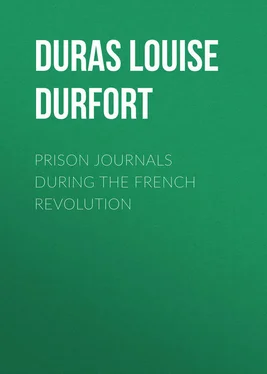Louise Duras - Prison Journals During the French Revolution
Здесь есть возможность читать онлайн «Louise Duras - Prison Journals During the French Revolution» — ознакомительный отрывок электронной книги совершенно бесплатно, а после прочтения отрывка купить полную версию. В некоторых случаях можно слушать аудио, скачать через торрент в формате fb2 и присутствует краткое содержание. Жанр: foreign_antique, foreign_prose, на английском языке. Описание произведения, (предисловие) а так же отзывы посетителей доступны на портале библиотеки ЛибКат.
- Название:Prison Journals During the French Revolution
- Автор:
- Жанр:
- Год:неизвестен
- ISBN:нет данных
- Рейтинг книги:5 / 5. Голосов: 1
-
Избранное:Добавить в избранное
- Отзывы:
-
Ваша оценка:
- 100
- 1
- 2
- 3
- 4
- 5
Prison Journals During the French Revolution: краткое содержание, описание и аннотация
Предлагаем к чтению аннотацию, описание, краткое содержание или предисловие (зависит от того, что написал сам автор книги «Prison Journals During the French Revolution»). Если вы не нашли необходимую информацию о книге — напишите в комментариях, мы постараемся отыскать её.
Prison Journals During the French Revolution — читать онлайн ознакомительный отрывок
Ниже представлен текст книги, разбитый по страницам. Система сохранения места последней прочитанной страницы, позволяет с удобством читать онлайн бесплатно книгу «Prison Journals During the French Revolution», без необходимости каждый раз заново искать на чём Вы остановились. Поставьте закладку, и сможете в любой момент перейти на страницу, на которой закончили чтение.
Интервал:
Закладка:
I was not pleased at the reception given a fat curate from Noyon who had apostatized, and had denounced and caused to be imprisoned a good many of our fellow-prisoners. He was hooted at from the head of any stairway he attempted to ascend; and the crowd pushed him back, and used syringes upon him. I was very sorry to see a man so lost to principle among us; but I should have preferred not to see any unfortunate being insulted. Any one is unfortunate who has lost his liberty; and those who are wicked are the most to be pitied under such circumstances. I was sorry also for those who, instead of thinking of more serious things, fed themselves with vain hopes concerning the future, and the possibility of shaking off their fetters.
I grew accustomed to living at Chantilly, and my companions in misfortune treated me with great kindness. Madame de Séguier and Mademoiselle le Caron de Troupure, now Madame Flomond, both amiable and excellent women, were a great comfort to me. I tried to help those who needed courage. The Coincy family, who lodged near me, were good company. I had great consolation from a religious point of view. A venerable priest undertook to confess me, and even to give me the communion. He had had the courage to bring a large supply of consecrated wafers, and had kept them in spite of the danger he ran should the fact have been discovered.
I was quite content with my fate, since I was compelled to endure a hard one. I could not have asked to be in a better prison; Providence had placed me there, and six months sojourn had accustomed me to it.
Toward the end of March, 1794, I received a letter from my mother, full of kindness, but which grieved me very much. She told me that she had thought it astonishing that I made no application to the government commissioners who came to Chantilly, to be allowed to join her. This intimation seemed to be an order and a command of Providence which altered my destiny. I immediately inquired when Citizen Martin, who inspected our house, was to come. I presented him a petition, asking to be sent to the Luxembourg by the first train destined for Paris. He assented, and then occupied himself in getting ready a most atrocious party, composed of young girls who were torn from the arms of their mothers without knowing for what they were destined.
Many persons believed, and it was really talked of, that the intentions of the Terrorists was to marry them to sans-culottes . To this party were added some priests, women, laymen, etc. The unhappy mothers were in despair. I was a witness of the scene with Madame de Pons (formerly Vicomtesse) at Perdrix's apartments. She fell on her knees before him and before Martin; she said everything to them that the desperation of such a moment could suggest, using the most touching expressions; they would listen to nothing. She fell fainting at their feet. After she recovered her consciousness, she implored to be permitted at least to follow her daughter; they refused her.
I forgot to say that a moment before Madame de Pons came to see Perdrix the latter had sent for her daughter, and in the presence of Martin and two gendarmes said to her,
'What is your name?'
'Pons.'
'Yes, but give your Christian names.'
'You should speak to my mother; I will go for her.'
'No, no; I ask you for your names.'
'There they are. May I know what use you have for them?'
'You will leave here with other prisoners to-morrow, to go to another prison.'
'Without mamma! O God! What will be my fate?'
'Go, or I will have you carried out.'
Madame de Pons wrote several letters to Martin, asking only for a delay; she offered all her property to the Republic; and the only answer she received was, 'Your daughter must go!'
I busied myself in arranging my trunks and packing them for the Luxembourg, so as to have with me only what was strictly necessary. On the 3d of April, 1794, we were told to hold ourselves in readiness to leave the next day or the day following, as the carriages were expected. My travelling companions were in despair at leaving their parents, but I delighted at going to see mine once more; every one said pleasant things to me. I received many testimonials of interest and regret from the prisoners. There were some from whom I was grieved to part, and a secret presentiment (though generally I do not believe in them) seemed to warn me that the reunion with my parents would never be effected. The days of the 3d and 4th were passed in leave-taking. I did not know that the train was to start early on the 5th, the anniversary of the birth of my son. I was summoned at ten o'clock in the morning. I found the wagons almost full; consequently I had a wretched seat next a vile woman who boasted of being a friend of Robespierre, and told us that she would receive on the way some marks of public interest. She sat almost half on top of me; and to add to our suffering, the straw which is usually put in the bottom of the carts for calves, was left out. When we left, the courtyard was filled with our companions in misery, who were mourning and sighing over our fate. They concealed their tears, fearing to let them be seen.
Конец ознакомительного фрагмента.
Текст предоставлен ООО «ЛитРес».
Прочитайте эту книгу целиком, купив полную легальную версию на ЛитРес.
Безопасно оплатить книгу можно банковской картой Visa, MasterCard, Maestro, со счета мобильного телефона, с платежного терминала, в салоне МТС или Связной, через PayPal, WebMoney, Яндекс.Деньги, QIWI Кошелек, бонусными картами или другим удобным Вам способом.
1
The Prince de Poix, who had defended and followed the king on the 10th of August.
2
A line of Racine. – Translater.
3
This 'little château,' dated from the sixteenth century, is one of the finest specimens of Renaissance architecture in existence, and was included in the gift of the Duc d'Aumale to the French nation (1886). The Grand Château, where Condé had spent twenty years of his life, and which was so famous for its literary associations with the names of Molière, Boileau, Racine, and La Fontaine, was destroyed in 1793. – Translater.
Интервал:
Закладка:
Похожие книги на «Prison Journals During the French Revolution»
Представляем Вашему вниманию похожие книги на «Prison Journals During the French Revolution» списком для выбора. Мы отобрали схожую по названию и смыслу литературу в надежде предоставить читателям больше вариантов отыскать новые, интересные, ещё непрочитанные произведения.
Обсуждение, отзывы о книге «Prison Journals During the French Revolution» и просто собственные мнения читателей. Оставьте ваши комментарии, напишите, что Вы думаете о произведении, его смысле или главных героях. Укажите что конкретно понравилось, а что нет, и почему Вы так считаете.












